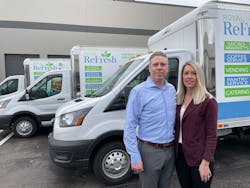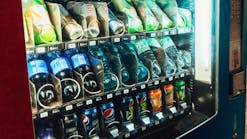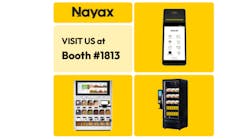Future Forward: Oregon's Royal ReFresh looks to micro markets and name rebrand to fuel growth
It’s not often that a vending company can boast about yearly growth – let alone nearly 100% growth in just two years – but that’s exactly what Ryan and Michelle Harrington have done with their Portland, OR-based workplace refreshment company. The duo has seen a doubling in business every two years and has had 91.8% growth from 2017 to 2019 alone, fueled primarily by the company’s focus on micro markets. In fact, the Harringtons are so confident in the company’s future of micro markets that in 2021 they are embarking on a company rebrand, moving from the name Royal Vending to Royal ReFresh.
CHALLENGES AND OPPORTUNITIES
The Harringtons entered the vending industry almost by chance. In 2007, Ryan placed his first Red Bull vending machines in hopes of starting a profitable side gig. Several years later, he jumped into the industry full time, purchased a warehouse and built up enough routes that Michelle left her job in human resources to manage the Royal Vending company.
For several years, the company focused on vending, placing a new machine each week, but they weren’t seeing much growth. “For the most part, a single vending machine placement is a very small increase in revenue,” Ryan said.
All of that changed in 2014 when the company launched its first micro market. “We saw the revenue lift and the increase in customer satisfaction, and it was just a lightbulb moment,” he continued. “We thought ‘This is it; this is the ticket.’”
In their first year, they placed six markets in about six months, but knew that they could handle more. “In 2015 we looked at our process and decided that we could probably put one micro market in every two weeks,” Ryan said. The following year they began placing one market a week and in 2017 they began placing two markets per week.
“We noticed early on that we had an opportunity,” he continued. “Our area was not saturated with micro markets so we felt we could win with customer service, our good name and having word-of-mouth bring in new clients.”
Once Royal determined it wanted to grow its micro market business, it was time to face the challenges of how to make that happen. The Harringtons focused on building the infrastructure to handle the growth, including hiring a winning team, manufacturing custom fixtures (snack walls and cabinets) and creating a strong rollout plan.
As the company’s micro market segment grew, the Harringtons noticed a lot of differences compared to the vending side of business. “There wasn’t a lot of computer work with vending,” said Ryan, “but with micro markets, it changed the entire look of our company. We knew we needed personnel with more analytical skill sets, focusing on data. We have technicians who need to be in the field to fix vending machines, but with markets, a lot of it is remote.”
Ryan and Michelle also focused on bringing in personnel to make sure that the company’s micro market customers were taken care of through the creation of a customer experience team that answers every single call. “We want to make sure our customers are always taken care of, no matter what,” Ryan said.
Beyond adding personnel, Royal made a plan to handle the volume of micro market placements on the backend. “Every Monday we are installing two new markets and every Tuesday and Wednesday we are doing grand openings and on Thursdays and Fridays we are getting ready for the next week,” Ryan said. “We needed to come up with the infrastructure to be able to grow at that speed and that’s what we did.” The company was purchasing new trucks every five months, which allowed it to service even more markets than before. “We wanted to have the infrastructure in place already and sell into that infrastructure,” Ryan said.
Micro markets have been the segment that has launched the success and growth of Royal ReFresh, helping lift its annual revenue from $2.4 million in 2017 to $4.5 million in 2019. In fact, micro markets now represent 75% of the company’s sales. Regardless of what some may think, offering micro markets isn’t what sets the company apart from competitors – it’s the drive to improve the workplace refreshment experience for all customers.
CUSTOMER EXPERIENCE
Customer care is what drives the Royal ReFresh team. Despite its sales doubling in just two years, the company has never hired a salesperson. Instead, it has focused on taking care of its current clients, giving them the best experience possible. “If we can make sure we take care of everyone, they will talk and spread our name,” said Ryan. “Now people are calling us. The whole reason we are all here and the whole reason there are new positions opening up is because of our customers. We just try to think about that every day.”
The company has always been an early adopter of technology. The Harringtons felt that technology was important for the company’s customers, so Royal added cashless capabilities to each of its vending machines, placed every machine on a VMS and adopted 365 Retail Markets’ newest micro market platform. “When we see a technology innovation that is going to improve our delivery to our customers and our customer satisfaction, then we are going to invest in it,” Ryan said. “We’ve been doing that and plan on doing that moving forward.”
With Michelle’s background in human resources, Royal ReFresh adds to the customer experience by partnering with locations on their employee benefits programs using micro market subsidies. “On every new market we install, we offer our healthy subsidy program, and that has been successful,” Ryan said. This means the location will generally subsidize the price of the healthy and fresh products so that their team members have access to these options at lower prices.
“It has really been successful to entice employees to eat healthier and we can make it part of that company’s wellness program and it increases market usage,” Ryan added. In fact, Royal has seen some market sales double from implementing this program. “It’s a win for the customer because their employees are going to stay on site and use the market more and it’s a win for us in that we can take that smaller employee population or footprint and still get the same sales as if it were twice as large.”
The Harringtons believe that, in the future, companies will save money on lease and rent and put that savings into their employee benefits programs. “That’s what we are going to be focusing on for the future,” Ryan said.
REBRANDING FOR FUTURE
Today, the Harringtons operate 219 vending machines that make up 15% of revenue. With that number shrinking annually, Ryan and Michelle believe it is the perfect time to refresh their company name from Royal Vending. The company is changing its name to Royal ReFresh to not only showcase its fresh food options, but also to let customers know they can refresh the breakroom.
“We wanted to keep the ‘Royal’ because it has equity in our area and we wanted to add “ReFresh” because we focus on fresh and it’s a good message to people looking on the web that we can give them a new breakroom,” Ryan explained. “Fresh is the focus of our company. Customers call us and they want to refresh their breakroom and they want fresh food. No matter how many employees they have on site, we want to find a way to provide fresh products. That’s what we wanted our logo and branding to emphasize.”
With all the changes happening in 2020, the Harringtons felt there was no better time than the present to rebrand. “We were at a limit with how much we could grow in the last three years. We’ve always talked about doing this but just put it on hold because we didn’t have the capacity to take on that challenge,” said Ryan. Now the company has developed a new logo, a new website and is in the process of rebranding its micro markets as ReFresh Cafés. They’ve also hired VendCentral to work on the company’s social media marketing.
Royal ReFresh is also “refreshing” its micro market design features. As part of its rebranding, the company now offers custom fixture packages to its customers and will be partnering with design innovators Fixturelite and Translucent, who share Royal’s aesthetic values, to construct stylish micro market environments.
Ryan and Michelle are optimistic about the future of Royal Refresh and are excited about the improvements and new technologies being introduced to the industry each year.
“Our partners are focused every day on still coming up with something better and improving and if we can improve the experience for our customers, we are going to be implementing it out in the field,” Ryan said. “We see 2021 and beyond as really big growth years.”
Royal ReFresh at a glance
Headquarters: Tigard, OR
Year founded: 2006
Owners: Ryan and Michelle Harrington
No. of employees: 17
No. of micro markets: 164
No. of vending machines: 219
No. of routes: 8 total (7 micro market/OCS mixed and 1 vending)
Equipment providers: Fixturelite, Flavia, IDW, Newco, OmniCube, OptConnect, TriTeq, USAT and USI
Tech providers: 365 Retail Markets, Lightspeed Automation, ParLevel, Translucent and VendCentral
COVID-19 Response
While 2019 was a stellar year for Royal ReFresh, 2020 was the company’s first year without growth. “When March [2020] hit, closures happened all at once,” owner Ryan Harrington recalled. “Places closed on a daily basis and companies sent their employees to work from home. In July, some companies tried to bring their employees back only to close down again. It has been a tough year to navigate.”
Before Covid-19, Harrington would have bet big that pantry service was the future of Royal ReFresh, but the pandemic turned everything upside down for the company. “In 2020 our pantry service declined a lot,” he said. “Buildings are sitting empty and there’s not much to do about it. I still think there is a future in [pantry service], but at the moment it doesn’t make up a large part of our revenue.”
Despite the uncertainty of when or if employees will return to offices, Ryan is grateful for and amazed by the company’s team members. “We’ve changed a lot of our procedures and I’m just amazed at how our team has adapted and changed on a moments’ notice. Everyone has hit this in stride,” he said.
The Royal ReFresh organization is optimistic about 2021 and have already seen a big increase in sales in the manufacturing and distributing facilities it serves. “We are predicting that we will be back to two micro market installations a week in 2021,” Ryan said. “And if we can, we would like to increase that.”

Adrienne Klein | Contributing Editor
Adrienne Zimmer Klein is a freelance writer with a background in the vending, micro market and office coffee service industry. She worked as an associate editor and managing editor at Automatic Merchandiser and VendingMarketWatch.com from 2013 until 2017. She is a regular contributing writer at Automatic Merchandiser.






